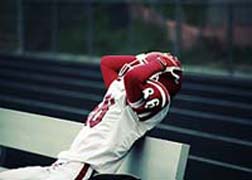 The death of athlete Dave Duerson was a shock to some, all the more so because he committed suicide. Duerson, a former player for the Chicago Bears, shot himself in the chest in February 2011, leaving a note requesting his brain be given to the NFL's brain bank.
The death of athlete Dave Duerson was a shock to some, all the more so because he committed suicide. Duerson, a former player for the Chicago Bears, shot himself in the chest in February 2011, leaving a note requesting his brain be given to the NFL's brain bank.According to the Chicago Daily Herald (05/02/11), Duerson suffered 10 concussions in 11 years playing in the National Football League. Now, researchers from Boston University's Center for the Study of Traumatic Encephalopathy have confirmed that Duerson had traumatic brain damage, resulting in problems with his short-term memory and impulse control.
One researcher remarked that if Duerson did not have a moderately advanced case of chronic traumatic encephalopathy (CTE), he most likely would not have developed the health issues he had and may not have decided to end his life.
The Chicago Sun-Times (05/03/11) reports that the NFL has examined the brains of 15 former players and found CTE in 14 of them, reportedly leading to some concern about the health of players who face repeated brain injuries.
READ MORE BRAIN INJURY LEGAL NEWS
Some states are developing rules regulating when young athletes can return to sports after suffering a brain injury. Coaches are being required to take courses so they can recognize the signs of a concussion. These moves, however, come too late for some young athletes who have already suffered debilitating brain injuries.
Unfortunately, according to USA Today (04/26/11), some states are still indifferent to laws designed to limit youth concussions. The newspaper notes that the indifference "borders on negligence," and reports that an average of 64,000 high school football players suffered concussions every year from 2005 through 2008. That indifference could put a young athlete at risk of permanent brain damage or death—all for the love of a sport.
